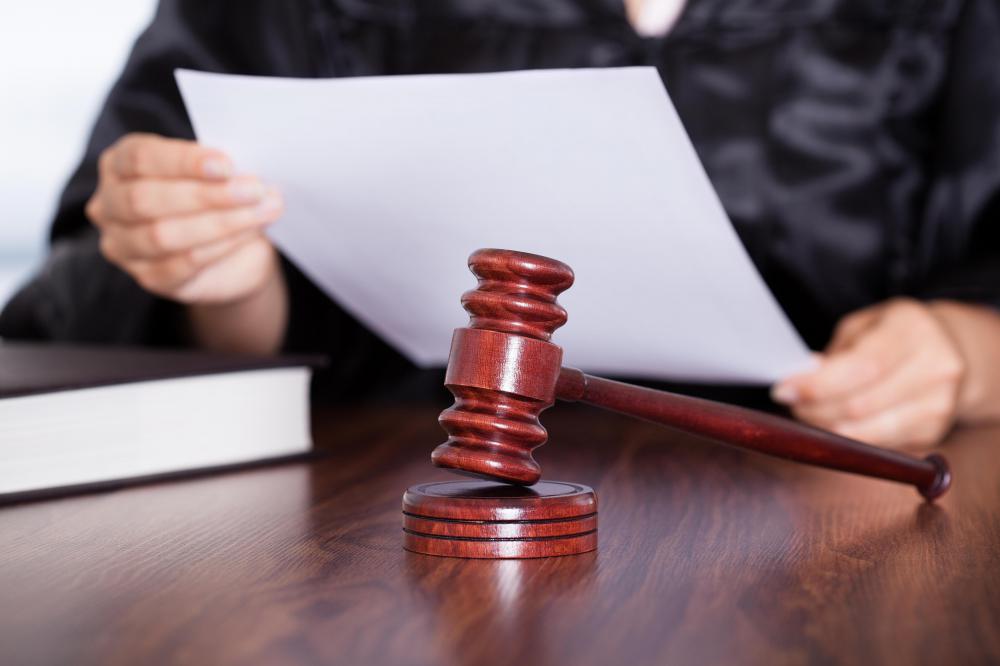At WiseGEEK, we're committed to delivering accurate, trustworthy information. Our expert-authored content is rigorously fact-checked and sourced from credible authorities. Discover how we uphold the highest standards in providing you with reliable knowledge.
What is a Jury Verdict?
A jury verdict is the conclusion reached by jurors based on the evidence presented by both parties to a criminal or civil trial. The verdict is different from a judgment, which is based on the jury verdict and entered by the judge, who must apply state laws. In criminal trials, court verdicts are either guilty or not guilty. In civil trials, the jury renders a general verdict to determine liability and damages or a special verdict to find factual findings on which a judge can determine a verdict. If the jury cannot reach a verdict, then the court will deem it a hung jury, and the case is often dismissed.
After both parties have presented closing arguments, the judge will instruct the jury on the applicable laws and the requirements for reaching a verdict. The process of reaching a verdict is referred to as jury deliberation. Members of the jury often take a vote at the beginning, during, and end of jury deliberation to determine whether a verdict is reached. There are some occasions in which the evidence is so overwhelming that the legal requirement for the jury to reach a unanimous or majority vote takes place within minutes of deliberation, upon the first vote. The foreman, one member of the jury selected by the other members, will announce the verdict in court to the judge.

Parties to a civil lawsuit can avoid a jury verdict by settlement as long as the case is settled prior to closing arguments. For example, a defendant may offer to pay for some of the damages that the plaintiff is seeking in exchange for ending the legal battle. Judges often give both parties the opportunity to settle the case, and the settlement has to be in writing. The defendant in a criminal trial can also reach an agreement with the prosecution prior to a jury verdict, which is often accepted by the judge. In those cases, the defendant usually admits guilt to some charges, and the prosecution agrees to dismiss some.

An attorney, pro se plaintiff, or pro se defendant can research a jury verdict as part of the case preparation in order to formulate strategies for the trial. There are regional and national databases that collect, review, and analyze jury verdicts, and the information is often compiled by trial attorneys. Judges will sometimes utilize the database in order to evaluate verdicts, especially if the verdict includes an award for damages.
AS FEATURED ON:
AS FEATURED ON:

















Discussion Comments
If a person's trial has been ruled a mistrial due to the jury not being able to agree a verdict and a re-trial cannot go ahead on medical grounds due to the victim being too ill to go through the ordeal of another trial, how does this leave the accused?
Are they guilty, not guilty or just something in between?
@stl156 - The forefathers wrote the Constitution keeping in mind the dangers of the majority and the same thing goes for the courts.
The reason why most states have a court system set up for unanimous consensus for juries is because a unanimous consensus means that the jury verdict is beyond a reasonable doubt and this is to combat a problem that lies with the majority rule principle.
Unfortunately the majority rule principle cannot work in all cases because if someone is found guilty by a jury with a 5-4 decision that means 4 people did not believe the person committed murder. This stands out to me a lot more than the majority as there are way to many factors that could have swayed their decision like a bad witness or a really good prosecuting lawyer who is very convincing with hearsay and conjecture.
A unanimous consensus is a bit of insurance for the case to be fairly decided and there not to be instances where the jury is split and just barely sways one direction, which may be for other factors besides guilt or innocence.
@Emilski - Although this sounds like a good practice in theory I have to really wonder about its effectiveness.
Although the prosecution and defense can compromise all they want in the end they do not have any idea how the people in the jury are going to act when they deliberate.
It is entirely possible that someone could have an unknown agenda and tries to get on the jury to be a type of cowboy and may have the power go to their head. I have heard various instances of this happening and it hampering juries and the case in court.
I think though that a majority system may fare a lot better in the courts and can help return jury verdicts in a much fairer manner than what is in the present. Unfortunately it is just way to difficult to get a unanimous consensus on a jury and it is very hard on the legal system with both time and money.
@Izzy78 - I think that as far as the mock trial goes that you saw if it was a real case that person would never be allowed on the jury.
They never allow friends or acquaintances on the jury and I would go on to guess that during jury selection they would not allow someone that is biased, like a fan of a sports figure on trial, because the prosecution will guess that he or she could potentially hurt the case and create a hung jury.
In jury selection both the prosecution and defense have to agree on who is selected in the jury pool and they do not have to justify why they choose not to select them. This is a process of compromise and allows a fair selection of the jury.
Despite this there will be instances in which someone will be very stubborn and refuse to go along with everyone else. Some reasons may be legitimate and some may be unfounded and ludicrous.
I have always wondered about hung jury verdicts and why is it that in a lot of cases it has to be unanimous?
It seems to me that this is a flaw in the law and that one person, who is simply ignorant or being stubborn can completely derail a conviction.
I remember seeing a mock trial on television and there was this one person that refused to go along with anyone else simply because he happened to be a fan of the person on trial, who happened to be a famous baseball player.
I know this was a mock trial over something that was not really illegal and just for fun but it showed me how one person can unfairly ruin the prosecutions case and completely tangle up the legal system costing tax payers even more money.
@Mykol - I am pretty sure that a mistrial in the case of a hung jury can be retried. There are certain criminal trials where a unanimous decision must be reached, but I know you can retry a civil case.
There are also certain rules or restrictions regarding some federal jury verdicts. If you are ever picked for jury duty, all of that is clearly explained to you.
Many people complain when they are picked for jury duty. My brother works in sales, and if he misses a lot of time from work, this can have quite a negative impact on his earning potential.
For some people serving on a jury is more convenient than others. My mom is the primary caregiver for my handicapped sister. The few times she has been called for jury duty, she is released because of this obligation.
I have been called for jury duty more than once. I have friends who have never been called, but my name has come up several times. I don't know the process they go through for people to serve on a jury, but I have always found it interesting.
One time we ended up with a hung jury verdict. No matter how long we deliberated, we could not come up with a unanimous decision.
After the trial, I never followed up with the case. I wonder when you have a hung jury like that, if the prosecutor can try the case again or not.
I was recently on a jury for a civil case regarding a doctor and hospital vs a patient. The patient was suing the doctor, and the trial ended up lasting about 10 days.
This was the first time I had served on a jury, and I found the whole process very interesting. It was pretty easy to select our jury foreman, as he had a lot of leadership qualities and everyone agreed he would be the best choice.
Once all the evidence was presented and closing arguments were given, the jury deliberated. We were free to come and go during this trial, but could not discuss anything about the trial to anyone during this time.
We were able to come to a decision within a day, but that was not without quite a bit of discussion. There were two people who were having a hard time deciding which way to go, but we eventually came up with a unanimous decision.
Post your comments